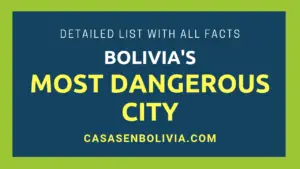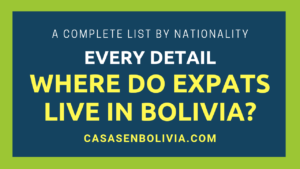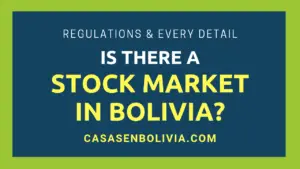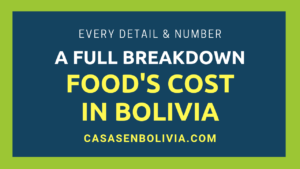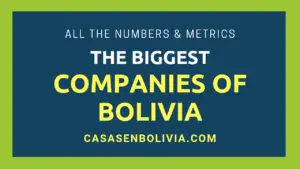Last Updated on February 15, 2025
In Bolivia, cash remains the predominant method of payment for everyday transactions when purchasing goods and services. Many stores, even those in high-income neighborhoods, primarily accept cash. While credit and debit cards are used to some extent, and PayPal cards are fully supported, cash is still king.
The primary payment options available in Bolivia for tourists are cash, debit or credit cards from Visa or MasterCard, and PayPal or Payoneer cards. For residents, additional options include Bolivian bank accounts, Soli from BCP Bank, and Tigo Money. Over 95% of transactions in Bolivia are conducted in cash.
In this article, we’ll discuss the various payment methods and options available in Bolivia, for both tourists and residents, covering their restrictions and how to use them. We’ll also offer tips on choosing the best payment options for your needs. We are Bolivian real estate experts (website) who have lived in Bolivia our entire lives.
The Various Payment Options Available in Bolivia
Many payment options and methods that function globally *also work in Bolivia*, but many others are not fully supported. You have options like your Visa/MasterCard debit or credit card, Payoneer, Soli from BCP Bank, Tigo Money, and more.
However, in general, *you’ll need to rely heavily on cash in Bolivia*. Bolivians are still very accustomed to using cash rather than other digital or instant payment methods. We estimate that over 95% of transactions currently conducted in the country are done with cash.
Your residency status in Bolivia also affects your available payment options, as tourists have fewer choices.
It Also Depends on Your Residency Status
The options available to you for using different payment methods in Bolivia also depend significantly on your residency status, which can be:
- Tourist.
- Temporary or permanent resident.
- A business operating in Bolivia.
Depending on your status, you’ll be permitted to use different payment options and methods, as we’ll explain below.
1) As a Tourist
As a tourist in Bolivia (meaning you don’t have a Bolivian-issued identification card), you are limited in your payment options. Without this document, you cannot open a bank account in Bolivia, nor can you utilize the more advanced payment methods commonly used by Bolivians.
Therefore, in this situation, *as a tourist*, you have only the following options:
- Cash (still very prevalent in Bolivia)
- Your standard credit or debit card
- PayPal cards
- Payoneer prepaid card
Cash (Still Very Common in Bolivia)
In Bolivia, using cash remains extremely common. The adoption of other payment methods, such as credit or debit cards, QR code payments, and online payments, *is not widespread*. Therefore, whenever you’re in Bolivia, you should carry some cash in your wallet to facilitate most transactions within the country.
Also, remember to use Bolivianos (Bs.) and not US dollars, as most people won’t accept them. Furthermore, using USD can make you a target for robbers and scammers.
Whenever you’re in Bolivia, for a typical day, you should have between Bs. 200 and Bs. 350 ($30 to $50) in cash on your person for everyday purchases.
You’ll observe that in Bolivia, even in malls and luxury stores, the most common payment method is cash (used in over 95% of transactions). People here are still not accustomed to paying or receiving money through other methods.
Your Standard Credit or Debit Card
Another commonly available payment option in Bolivia is the use of debit and credit cards. Many stores and supermarkets, as well as major commercial centers and malls, and all airports and some bus stations, *currently accept credit and debit cards*.
It’s also important to know that credit and debit cards from Visa and MasterCard are widely accepted in some luxury stores within residential neighborhoods, on some Bolivian e-commerce websites, and at almost all ATMs. However, American Express and Maestro cards *are not well-supported within the country*.
Therefore, whenever you travel to Bolivia, ensure you bring a credit or debit card backed by either Visa or MasterCard.
PayPal Debit and Credit Cards
You can also fully utilize your PayPal credit or debit card within Bolivia if it’s powered by Visa or MasterCard.
Additionally, you can use your PayPal account while in Bolivia, *but not for making purchases from most Bolivian companies or Bolivian e-commerce stores*. This means you can use your PayPal account *as usual while in Bolivia*. PayPal doesn’t restrict your account while you’re located within Bolivia.
However, because Bolivian companies cannot accept PayPal payments, you won’t be able to use this payment processor to pay for purchases within the country.
Nevertheless, you’ll still be able to use your regular PayPal account to make purchases from international companies, including Amazon (which, by the way, can deliver many goods to Bolivia within a matter of days, using appropriate couriers like DHL and similar services), while you’re staying in Bolivia.
Also, keep in mind that in Bolivia, the use of e-commerce and online stores *is not yet widespread for most goods and services*. People in our country are still accustomed to buying things in person, *even after the pandemic*. However, in recent months, people and companies have become more accustomed to purchasing food and basic goods through e-commerce stores and delivery companies.
We have a comprehensive guide on whether PayPal works in Bolivia, with all the details for both Bolivian and foreign PayPal accounts: Does PayPal work in Bolivia? All you need to know.
Payoneer Prepaid Card
Payoneer also offers prepaid cards that can be used in Bolivia, at any ATM in the country. These prepaid cards are powered by MasterCard, so if you have access to Payoneer and possess its card (only the USD card, not the Euro card, *as you cannot withdraw money in Euros in Bolivia; it’s not a widely used currency*), then bring it with you to use it at Bolivian ATMs.
2) As a Temporary or Permanent Resident
Becoming either a temporary or permanent resident in Bolivia grants you access to a foreigner ID card, an important document that allows you to utilize many more types of services, including additional financial and banking services. With this document, you can open a bank account and use other payment methods in Bolivia.
If you have either temporary or permanent residency in Bolivia, you have the following additional payment options available:
- Your bank account at a Bolivian bank
- Soli from BCP Bank
- Tigo Money Bolivia
Your Bank Account at a Bolivian Bank
As mentioned, if you’re a resident of Bolivia, you’re permitted to open bank accounts at Bolivian banks. Therefore, once you have a Bolivian bank account, *it will function similarly to bank accounts in other countries*, enabling you to send, receive, and withdraw money, make wire transfers, pay for goods, etc.
To open a Bolivian bank account, *you must be at least a temporary resident*.
Soli from BCP Bank
Soli is a new solution for transferring cash, paying for purchases, and maintaining a virtual account in the country. *However, it’s only available to foreigners who already possess their foreigner ID*.
So, once you obtain this document, you’ll be able to utilize Soli from BCP Bank, which allows you to:
- Pay for certain services and products in Bolivia by simply scanning a QR code.
- Maintain a virtual account where you can hold money.
- Receive money from anyone in Bolivia who simply scans your QR code.
- Send money to anyone in Bolivia by simply scanning their QR code.
- Receive payments from your Bolivian customers by simply displaying your QR code.
- Withdraw money from your BCP bank account.
You can explore the app for this service and see its features (in Spanish):
- Play Store: https://play.google.com/store/apps/details?id=com.bcp.bo.wallet.
- App Store: https://apps.apple.com/us/app/soli/id1135987447.
To use Soli from BCP Bank, *you must be at least a temporary resident*.
Tigo Money Bolivia
This payment method is a solution offered by a Bolivian phone company called Tigo. It enables Bolivian citizens and residents *to use their phone numbers to send and receive money*, pay for services and products, and hold money in their Tigo Money account.
Many people use this payment method in Bolivia. Unfortunately, it’s only available if you have either a Bolivian ID card or a foreigner’s ID card. Therefore, if you’re solely a tourist, you cannot utilize this solution. However, you can have your phone working in the country.
To use Tigo Money Bolivia, *you must be at least a temporary resident*.
We have a comprehensive guide on obtaining residency in Bolivia, including all the steps, costs, precautions, and other details: [Link].
3) As a Business Operating in Bolivia
If you’re: a) an online business operating from another country and seeking to receive payments from Bolivia, or b) a business located in Bolivia that wants to receive payments online, then you have the following options:
- Stripe and Stripe Atlas
- Your foreign PayPal account
- 2Checkout
- PagosNet
- Your business bank account
- Soli from BCP Bank
- Tigo Money Bolivia
Stripe and Stripe Atlas
Stripe fully supports processing payments in Bolivia. Therefore, if you’re an international business seeking to receive payments from Bolivian customers *and have a Stripe account created in another country*, you can receive payments in Bolivia through this account without any restrictions.
However, if for some reason you cannot create a Stripe account outside Bolivia, you’ll first need to open a bank account in the US, using a service from this company called Stripe Atlas, before being able to process payments from Bolivian customers.
Your Foreign PayPal Account
You can also configure your PayPal account from your home country to process payments in Bolivia and receive payments from your Bolivian clients. There are no restrictions on your PayPal account; *the restriction applies only to PayPal accounts created in Bolivia by Bolivians*.
2Checkout
This international payment processor also fully operates in Bolivia, *but it only works for companies operating within the country*, not for individuals. Therefore, if you have either a Bolivian company within the country or a foreign company operating in Bolivia, you can activate this payment method to receive money from your clients.
PagosNet
This is a solution from a Bolivian company that *allows e-commerce stores within the country to receive payments from clients*, issue invoices according to Bolivian laws, and enable clients to make payments using QR codes, among other services. Therefore, if you’re either a Bolivian company or a foreign company operating in Bolivia, this is one of the best options for receiving payments from your clients.
Your Business Bank Account
Most people in Bolivia still transfer money between buyers and sellers using bank accounts. Even when purchasing goods from companies, they prefer to pay directly into the seller’s bank account, whether it’s an individual or a business seller. Therefore, if you want to receive money from clients in Bolivia, a Bolivian business bank account is one of the best options available.
Tips for Choosing the Right Payment Method in Bolivia
Depending on your location in Bolivia and your specific activities, we’ve listed the best options you have when making financial transactions:
- If you are paying for services and goods: The most common method is simply cash (over 95% of the time), in almost all situations. In very few stores can you pay with your credit or debit card powered by Visa or MasterCard.
- If you are receiving or sending money: By far, the best option you have is Western Union. This company fully supports both sending and receiving money inside and outside Bolivia, available to *tourists* and residents. We have a guide on Western Union in Bolivia, with all the details on how it operates here.
- When withdrawing money: Tourists cannot open a bank account in Bolivia. Therefore, the best option for them is to simply use their Visa or Mastercard credit or debit cards from their home country. Also, the USD Payoneer prepaid card works in Bolivia. *Euro currency is not widely used or well-supported in Bolivia*.
- When receiving payments from your customers in Bolivia: By far, the two best options are your PayPal account from your source country (as the Bolivian one won’t work) and Stripe or Stripe Atlas (the latter only if you cannot obtain a Stripe account outside Bolivia). In some cases, when you require a broader range of payment options, 2CheckOut can also be a viable solution.
Be sure to carry no more than Bs. 1,000 (approximately $150) in cash when you’re out in public, *as you could easily become a target for robbers and scammers*. You’ll also rarely need more than this amount of cash on a typical day while staying in the country.
Lastly, if you intend to use a credit or debit card, the best option is to use your regular debit or PayPal card, powered by either Visa or MasterCard, and *avoid keeping excessive funds in your bank account* to minimize potential losses in case of theft.
Conclusions:
In this guide on payment methods currently available in Bolivia, for paying for goods and services, receiving, sending, or withdrawing money, you’ve seen that by far the most commonly used method in the country is simply cash, accounting for over 95% of day-to-day transactions.
You’ve also learned that, to a much lesser extent, credit and debit cards, backed by Visa or MasterCard, are also used for making payments for goods and services in Bolivia. You also discovered that you can use the prepaid USD Payoneer card or PayPal debit and credit cards, but all of them must be powered by Visa or MasterCard.
Additionally, you’ve realized that upon becoming a temporary or permanent resident, you gain access to more payment options in Bolivia. With this status, you can open a bank account in the country and then pay for items and conduct other transactions. You can also use Soli from BCP Bank, which facilitates payments via QR codes, and Tigo Money, which allows you to pay with your phone.
Finally, you’ve seen that when operating a business, you can utilize other payment processors to receive payments from your Bolivian customers, such as a foreign PayPal account, Stripe, and PagosNet, among others. Also, you should carry no more than Bs. 1,000 or $150 on your person on a typical day in Bolivia, but most likely, between Bs. 200 and Bs. 350, to avoid becoming a target for robbers.
We hope this information has been helpful. If you’d like to learn more about how to use Western Union in Bolivia, including all the steps, requirements, available agencies, and fees, please visit our dedicated guide here: Western Union in Bolivia: All you need to know.
CasasenBolivia.com, information on living, working, investing, and traveling in Bolivia.


